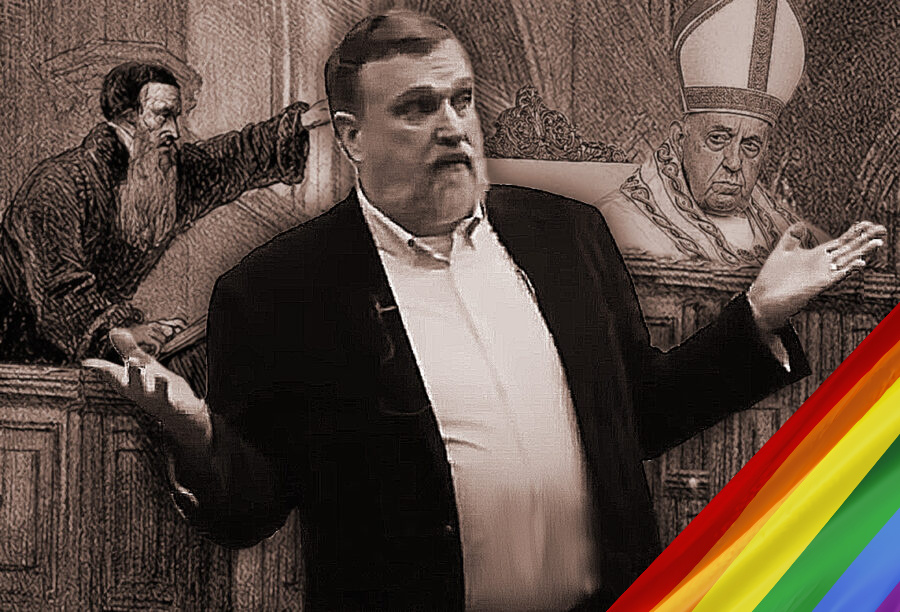Doug Wilson’s Hamartiological Orientation

Regular pew-sitters like myself have long been the beneficiaries of the unafraid, unapologetic wisdom of pastor Doug Wilson. We live in a church age where, as Wilson aptly noted in his blog post discussed below, the prizing of feminine characteristics in church leadership has created a “third sex” in evangelicalism. It is in this sea of weakling pastors that large numbers of evangelicals like myself are drawn to Doug Wilson’s brand of plain, masculine immovability – evangelicals likely to blast me for what is to follow.
The “Unnecessary” Controversy
One of the blessings of the internet (among its vast array of dangers) is the ability to keep tabs on the teaching of public Christians over time. Our current speaking and writing occur at the same time past versions of ourselves continue to teach from videos and articles we long ago forgot. Our digital expressions have no natural end, and at any time the Ghost of Teaching Past might return to remind everyone of our past errors. For the mature person, this return of the “ghost” leaves only two options: humbly repent and retract this prior error, or continue to cover it up in so much additional content that maybe no one will notice we’ve changed (or worse, that we haven’t). For Christians, the first is the only true option.
Such is the case with the recent rebuttal offered by Doug Wilson in response to a public challenge by Jared Moore on Jon Harris’s podcast (and to a lesser extent on ours) regarding the nature of so-called homosexual “orientation,” and the reemergence of old statements Wilson offered on the issue of homosexual concupiscence (strong desire) and its relationship with fallen human nature, temptation, and lust. Wilson was named alongside John Piper and Kevin DeYoung as a trusted pastor who has given ground on the issue, evidenced most pointedly by an answer he gave in a Q&A posted to YouTube in 2019 regarding whether a person could be both gay and a Christian. In his answer, Wilson indicated his acceptance of the existence of homosexual orientation and that homosexuals can avoid sinning merely by refusing to “express their sexuality in any kind of external way.” In 2022, Wilson responded to a question about homosexual concupiscence with an answer indicating he believes homosexual desire is mere temptation, which if resisted does not equate to sin.
What follows is an examination of this published response to the “unnecessary controversy,” in which Wilson starts by downplaying the seriousness of the issue before engaging in the kind of rhetorical obfuscation that is, well, vintage Doug Wilson.
A Novel Lexicon
Consistent with the “intuitive art” approach to hermeneutics popular among Federal Visionists (a label Wilson abandoned even as he claimed to have not really changed his beliefs), his response plays fast and loose with terminology (orientation vs identity, for example), is full of self-referencing and garrulous qualifications (I actually like this quirk in Wilson’s writing), and seemingly employs the same novel lexicon that found him using terms like “general equity theonomist” (as if the originators of theonomy hadn’t already defined the usage of the term).
Much like Wilson has previously taught that even Roman Catholics can be brothers in the “covenant community” merely by being subject to the civic benefits of the church, his claim that his church has “homosexuals in good standing” reveals a biblically unsupportable focus on outward works (“a sin” versus “sin”) as the arbiter of good fruit. Unfortunately, Wilson strawmans his “homosexuals in good standing” statement at Indiana University by claiming he referred to his church members as having a homosexual orientation without the identity. Yet anyone bearing the label homosexual would be considered by any modern culture – Christian or not – to be identified as a homosexual. This is categorically different from Wilson’s example of a person who steals being called a thief (a comparison he immediately undercuts by reminding readers that “thieving is not an identity”).
In case anyone doesn’t know, the term homosexual refers to someone practicing a lifestyle of homosexuality. Like the rest of us, Wilson does not get to redefine this term for his own purposes, and his identifying repentant believers in his church as “homosexuals” based apparently on their past, forgiven sin is a 1 Corinthians 6:11 error that goes uncorrected.
Later in the same paragraph, Wilson similarly employs his own definition of the word orientation, where instead of using its operational definition (natural sexual attraction to a defined gender), he redefines it as “how a person is likely to be tempted this time tomorrow” as if temptation sourced from within is not sin. Yet scripture does not talk about temptation, desire, or concupiscence with anything resembling the modern understanding of “orientation,” a concept that equivocates God’s design (heterosexuality) with its abominable counterfeits. This effectively means that when Wilson says “orientation” to a group of, let’s say “sexually broken people,” he says one thing and they hear another. A pastor of his giftedness should know that if we decide to use the term “orientation,” we cannot redefine it to our liking and get defensive when we’re inevitably misunderstood.
The One-Second Rule
Later in the post, Wilson uses the amorphous phrase “homosexual vulnerabilities”* when discussing what I will henceforth refer to as the One-Second Rule. In his example, a homosexual (by his 2019 definition) is attracted to a gay porn ad (what Romans 1:26 would call vile affections), but upon managing to reject clicking on it within a second the homosexual has managed to avoid sinning and has nothing to confess to God. His nature remains stubbornly open to this specific, unnatural sin, but he has “navigated the situation correctly” and need not be concerned with mortifying the “particular kink” that results in him seeing as good that which should rightly repulse him. According to Wilson, he passes the test if he halts the sinful continuation in one second or less, even as he laments his continued proclivity to love what God hates.
Of course, this example is comical when applied to other sins. A person who sees a stranger on the street and course corrects within one second of thinking it would be good to murder that person has still sinned at the moment they experienced any combination of thinking, feeling, or reacting as if murder is good. Adam and Eve fell in their hearts before eating the fruit, and would have stood condemned even they had managed to halt before that first bite. As modern culture has become fully LGBTQ-affirming, it is no coincidence that homosexuality is now offered a do-over on the James 1:14-15 path.
*Note: I agree that not every person is equally susceptible to the same temptations, so perhaps “vulnerabilities” is a helpful way to describe this reality.
The Impeccability of Christ
No discussion of the dynamics of sin would be complete without discussing the temptation of Christ, and unfortunately, Wilson more than muddies the definitional waters here as well. Temptation in scripture often describes trials that may or may not bring us to sinful desires or behaviors (James 1:12). These present an opportunity to sin, but are powerless apart from our fallen nature. These temptations do not equate to desire, do not refer to our internal consideration of the “benefits” of sinning (Matthew 15:19), and are separate from the sinful nature that makes us vulnerable to them (we rightly understand that Christ was not vulnerable to sinning). Yet temptation can also refer to the sinful opportunities presented by the sinner’s flesh nature, and these must be understood as the confession-worthy sin they are. Wilson’s example of the person seeing the gay porn ad as good is beyond mere external temptation – the person’s positive, natural reaction to it is itself a sin to be confessed, fled from, and mortified.
Of course, the reason Jesus resisted the devil’s temptation was not, as Wilson unfortunately insinuated, merely because God foreordained his victory. Christ’s nature was not and is not peccable (susceptible to sin in any respect) like his physical body was susceptible to injury. Rather, Jesus is God incarnate, perfectly capable of not sinning in deed, thought, or disposition. Jesus had absolutely no desire, inclination, or orientation to do anything other than the will of the Father, thus temptation (trials, deceitful claims) did not cause Him even for a moment to consider anything other than perfect obedience (even as Christ clearly experienced and expressed the frailty of his humanity). No back-and-forth battle was waged in the heart of Christ when He perfectly resisted the pathetic wiles of Satan.
Christ did not empathize with our sinful nature in his temptation (“feel the force of it,” as Wilson claims), He sympathizes with our weaknesses. That is, Christ is fully capable of understanding and having compassion for our struggle with the flesh. In no sense does the temptation of Christ indicate that He experienced fleshly temptation, as seeing the same sex as sexually attractive would be rightly understood to be. Wilson’s implication that Christ’s spiritual nature allowed the possibility of sin merely because his physical nature was breakable (which has nothing to do with sin) is a Christological error of soul-damning consequence.
Let me repeat that: Claiming that it is categorically possible for God to sin is heresy.
Concupiscence Does As Concupiscence Is
The title of Wilson’s blog response betrays an upside-down understanding of the relationship between our sinful nature and the sinful desires and actions that result from it. “Concupiscence Is As Concupiscence Does” is entirely backward and is sadly in harmony with the hamartiological teaching of so-called “Side B” (SSA) Christianity and Roman Catholicism, which both teach a particularly unbiblical point of innocence between sinful nature (sin) and its external result (a sin). In practice, they effectively combine sinful desire and the internal temptation it brings. Both teach that not only do external temptations remain in full force after our conversion (this is true), but our sinful desires that are drawn to those temptations (and birth their own) remain firmly immovable and can be properly overcome externally.
Why This is Not an Unnecessary Controversy
Does it really matter if a Christian has an enduring unnatural “orientation” so long as they don’t go any further in thought or deed? Does it matter if ” a sin” (a thought or deed) is the focus rather than “sin” (the flesh nature)? Yes, it matters. The Bible clearly establishes not that we are sinners because we sin, but that we sin because we are sinners. Our war – our repentance – must extend to all aspects of what is opposed to God’s perfection, including any and all remaining internal inclinations toward sin – whether we think we choose them or not. A pastor focusing on the external expression of sin or even the “stirring” of sin inside the heart does great damage to the essential truth that it is our nature, not our works that must be warred against.
The alternative presented by men like Wilson, Piper, and DeYoung leaves the door open for a person to recast their internal temptation to sin as being not sin so long as they keep it inside. Homosexuality is (among other things) our culture’s sin du jour, and at present SSA advocates can point to generally solid teachers to support their claim that they need not mortify their “orientation” so long as they don’t engage in (subjectively defined) gay outward expression. Making this works-based technicality the standard for obedience and sanctification is the gateway drug that leads to “covenant, same-sex friendships,” “hetero cuddling,” and every manner of effeminate perversion Doug Wilson would rightly condemn.
So what is the answer? First, we must not tolerate the usage of terms in a non-operational way. We must use terms like homosexual and orientation to describe what everyone who hears us presumes they mean. We must clearly define what the Bible teaches about temptation – its external (non-sinful) and internal (sinful) sources. Hold up claims about “homosexual orientation” to the logical light of other serious sins to see if what is then claimed even makes sense, especially because the world is demanding the church give their current pet sin a special exception (and they won’t stop there). We must insist that our errant brothers course correct, recant, and repent of their false teaching on this subject. Lastly, Christians must reinforce the truth that sinners do as sinners are, and God does as God is. There are no exceptions.
One more thing: Wilson chided Jared Moore for failing to note Wilson’s podcasts, blog posts, and commentaries on the subject. Assuming they demonstrate a different position than that which Moore has demonstrated, “I got it right other times” is not a defense for getting it wrong currently. And if these other materials harmonize with the Indiana University Q&A and the answer to Noah, they only reinforce Moore’s conclusion.







Wilson is a rank heretic for teaching and holding to the Federal Vision heresy. He has NEVER publicly repented of it. He is NOT Reformed, he teaches a warmed over Romanism pure and simple.
Avoid him at all costs. That this writer is more concerned with Wilson’s aberrant views on sexually, while Wilson continues to deny faith alone is telling. Piper should be avoided also for his heretical “2nd justification” lie.